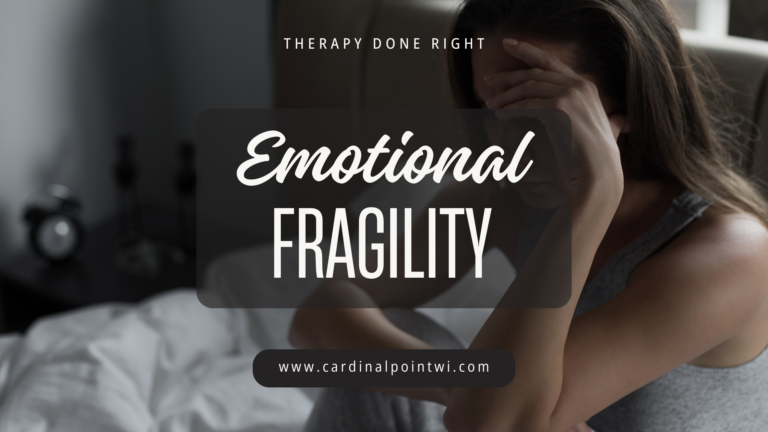In today’s world, the concept of resilience is often celebrated as the key to overcoming life’s challenges, from stress to adversity. It’s about bouncing back from setbacks, adapting to changes, and maintaining a sense of hope even when life gets tough. However, a troubling trend has emerged, where many people seem to be replacing this essential trait with emotional fragility. While resilience is built over time through experience and coping strategies, emotional fragility can make us more vulnerable to stress, easily overwhelmed, and less able to face life’s challenges.
What Is Emotional Fragility?
Emotional fragility refers to a state of heightened sensitivity to stress, rejection, or hardship. People who experience emotional fragility often react strongly to minor challenges, feel deeply affected by criticism, and find it difficult to handle uncertainty. It can stem from various factors, such as past trauma, chronic stress, or the overwhelming nature of modern life, but it often results in an inability to cope effectively with life’s natural ups and downs.
The Shift from Resilience to Fragility
Resilience is not about avoiding stress or hardship—it’s about developing the strength and mental flexibility to navigate through difficult times. But in today’s world, where instant gratification, social media comparisons, and an overemphasis on perfectionism have become commonplace, many individuals feel overwhelmed by the demands placed on them. This can cause a shift from a mindset of growth and strength to one of fragility and vulnerability.
Instant Gratification vs. Long-Term Growth
In a society that encourages quick fixes, we have become accustomed to expecting immediate results in all areas of life. Whether it’s a fast food meal or instant responses on social media, this shift away from patience and long-term perseverance has impacted our emotional development. When things don’t happen as quickly as we expect, we can feel overwhelmed and fragile rather than resilient, as we haven’t developed the coping mechanisms necessary for longer-term growth.Perfectionism and the Fear of Failure
Perfectionism is another key factor in replacing resilience with fragility. Many people are afraid of failure and the negative emotions that come with it. This fear leads to avoidance of challenges and risk-taking, which, over time, weakens emotional resilience. The desire to avoid uncomfortable emotions can instead foster fragility, as it prevents us from growing through the difficulties we face.Comparison and Social Media
Social media has dramatically influenced how we view ourselves in relation to others. Constant exposure to carefully curated versions of people’s lives can create a sense of inadequacy. When we feel we can’t measure up to the idealized portrayals of success, happiness, and beauty online, it can trigger feelings of fragility. Instead of relying on inner strength and resilience, many people internalize these comparisons and feel emotionally fragile as a result.
The Costs of Emotional Fragility
The shift from resilience to fragility may seem subtle, but its effects can be far-reaching:
Increased Anxiety and Stress
When we are emotionally fragile, small challenges can trigger a cascade of stress and anxiety. The inability to handle setbacks can make it harder to move forward in life, creating a cycle of feeling overwhelmed and stuck.Difficulty in Relationships
Emotional fragility can also impact our relationships. When we take things personally or react strongly to minor issues, it can strain communication and intimacy. Relationships require resilience—being able to navigate conflicts, disappointments, and emotional turbulence together. Without this foundation, it’s harder to maintain healthy connections.Stunted Growth and Personal Development
One of the most significant drawbacks of emotional fragility is that it limits personal growth. Resilience helps us build the skills necessary to navigate life’s challenges and become stronger in the process. If we choose to embrace fragility, we may avoid the very experiences that could help us grow, leaving us stuck in a cycle of avoidance and fear.
Rebuilding Resilience
The good news is that resilience is not an inherent trait—it’s a skill that can be developed and strengthened. Here are a few ways to build and maintain emotional resilience:
Practice Self-Compassion
Building resilience starts with being kind to yourself. It’s easy to fall into the trap of self-criticism, especially when we don’t live up to our own or society’s expectations. However, practicing self-compassion helps us weather the storms of life with more grace and understanding.Embrace Failure as Growth
Failure is not the enemy—avoiding failure is. Embrace setbacks as opportunities for growth. When you shift your perspective on failure, you can begin to view it as a stepping stone rather than a roadblock. Resilience grows when we learn to pick ourselves up after falling and continue moving forward.Limit Social Media Exposure
Comparing ourselves to others can drain our emotional energy. Limit your time on social media and focus on nurturing relationships that are based on authentic connections rather than virtual personas. Surround yourself with people who encourage your growth and are supportive when you face challenges.Develop Coping Mechanisms
Resilience requires effective coping strategies. Whether it’s mindfulness, physical exercise, journaling, or seeking professional support, building tools to manage stress and anxiety will strengthen your emotional resilience over time.Stay Flexible and Adaptable
Life is unpredictable, and resilience involves adapting to change. Instead of resisting uncertainty, try to accept it as part of life. When we are flexible, we can handle life’s unpredictability with greater ease and confidence.
Conclusion
While emotional fragility may seem like a natural response to the overwhelming demands of modern life, it’s crucial to remember that resilience is a skill that can be nurtured. The more we embrace discomfort, failure, and challenge, the more we strengthen our emotional muscles. In a world that often promotes fragility, it’s up to us to rebuild our resilience—one small step at a time. So, the next time life presents a challenge, remember: you have the strength within you to rise above it. For help with overcoming emotional fragility, reach out to our counselors at Cardinal Point Wisconsin Today.






